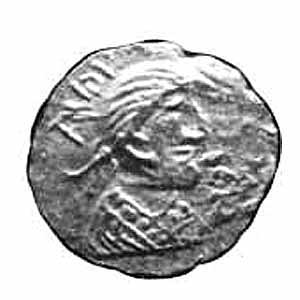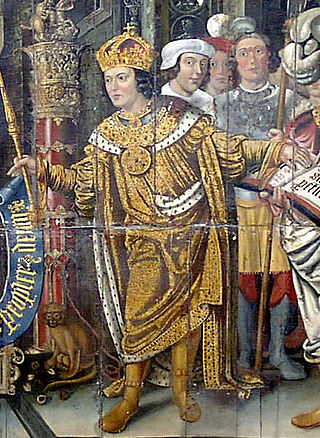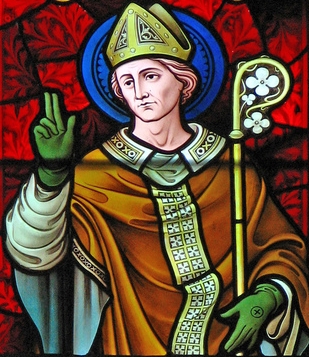Related Research Articles

Æthelred was king of Mercia from 675 until 704. He was the son of Penda of Mercia and came to the throne in 675, when his brother, Wulfhere of Mercia, died from an illness. Within a year of his accession he invaded Kent, where his armies destroyed the city of Rochester. In 679 he defeated his brother-in-law, Ecgfrith of Northumbria, at the Battle of the Trent: the battle was a major setback for the Northumbrians, and effectively ended their military involvement in English affairs south of the Humber. It also permanently returned the kingdom of Lindsey to Mercia's possession. However, Æthelred was unable to re-establish his predecessors' domination of southern Britain.

Wulfhere or Wulfar was King of Mercia from 658 until 675 AD. He was the first Christian king of all of Mercia, though it is not known when or how he converted from Anglo-Saxon paganism. His accession marked the end of Oswiu of Northumbria's overlordship of southern England, and Wulfhere extended his influence over much of that region. His campaigns against the West Saxons led to Mercian control of much of the Thames valley. He conquered the Isle of Wight and the Meon valley and gave them to King Æthelwealh of the South Saxons. He also had influence in Surrey, Essex, and Kent. He married Eormenhild, the daughter of King Eorcenberht of Kent.
Paulinus was a Roman missionary and the first Bishop of York. A member of the Gregorian mission sent in 601 by Pope Gregory I to Christianize the Anglo-Saxons from their native Anglo-Saxon paganism, Paulinus arrived in England by 604 with the second missionary group. Little is known of Paulinus's activities in the following two decades.

Eadbald was King of Kent from 616 until his death in 640. He was the son of King Æthelberht and his wife Bertha, a daughter of the Merovingian king Charibert. Æthelberht made Kent the dominant force in England during his reign and became the first Anglo-Saxon king to convert to Christianity from Anglo-Saxon paganism. Eadbald's accession was a significant setback for the growth of the church, since he retained his people's paganism and did not convert to Christianity for at least a year, and perhaps for as much as eight years. He was ultimately converted by either Laurentius or Justus, and separated from his first wife, who had been his stepmother, at the insistence of the church. Eadbald's second wife was Emma, who may have been a Frankish princess. They had two sons, Eormenred and Eorcenberht, and a daughter, Eanswith.

Cædwalla was the King of Wessex from approximately 685 until he abdicated in 688. His name is derived from the Welsh Cadwallon. He was exiled from Wessex as a youth and during this period gathered forces and attacked the South Saxons, killing their king, Æthelwealh, in what is now Sussex. Cædwalla was unable to hold the South Saxon territory, however, and was driven out by Æthelwealh's ealdormen. In either 685 or 686, he became King of Wessex. He may have been involved in suppressing rival dynasties at this time, as an early source records that Wessex was ruled by underkings until Cædwalla.
Cenwalh, also Cenwealh or Coenwalh, was King of Wessex from c. 642 to c. 645 and from c. 648 until his death, according to the Anglo-Saxon Chronicle, in c. 672.

Earconwald or Erkenwald was Bishop of London between 675 and 693.

Birinus was the first Bishop of Dorchester and was known as the "Apostle to the West Saxons" for his conversion of the Kingdom of Wessex to Christianity. He is venerated as a saint by the Roman Catholic Church, the Eastern Orthodox Church, and Anglican churches.
Berhtwald was the ninth Archbishop of Canterbury in England. Documentary evidence names Berhtwald as abbot at Reculver before his election as archbishop. Berhtwald begins the first continuous series of native-born Archbishops of Canterbury, although there had been previous Anglo-Saxon archbishops, they had not succeeded each other until Berhtwald's reign.
Trumbert was a monk of Jarrow, a disciple of Chad and later Bishop of Hexham.
Daniel (Danihel) of Winchester was Bishop of the West Saxons, and Bishop of Winchester from c. 705 to 744.
Hædde was a medieval monk and Bishop of Winchester.
Diuma was the first Bishop of Mercia in the Anglo-Saxon Kingdom of Mercia, during the Early Middle Ages.

Eadhæd was a medieval Bishop of Lindsey and sole Bishop of Ripon in the Medieval era.
Waldhere was an early medieval Bishop of London, England.
Bifus or Bisi was a medieval Bishop of the East Angles.
Ealhstan was a medieval Bishop of Sherborne.
Leuthere was an Anglo-Saxon Bishop of Winchester.

Agilbert was the second bishop of the West Saxon kingdom and later Bishop of Paris. He is venerated as a saint within the Catholic Church, with his feast day falling on 11 October.
The Christianisation of Anglo-Saxon England was a process spanning the 7th century. It was essentially the result of the Gregorian mission of 597, which was joined by the efforts of the Hiberno-Scottish mission from the 630s. From the 8th century, the Anglo-Saxon mission was, in turn, instrumental in the conversion of the population of the Frankish Empire.
References
- Fryde, E. B.; Greenway, D. E.; Porter, S.; Roy, I. (1996). Handbook of British Chronology (Third revised ed.). Cambridge: Cambridge University Press. ISBN 0-521-56350-X.
- Kirby, D. P. (2000). The Earliest English Kings. New York: Routledge. ISBN 0-415-24211-8.
